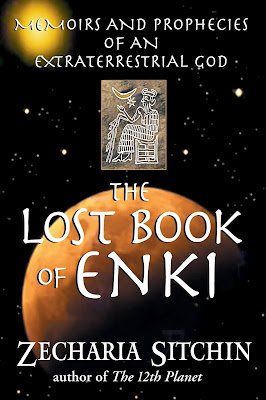About The Book
The companion volume to The Earth Chronicles
series reveals the identity of mankind’s ancient
gods
• Explains why these “gods” from Nibiru, the Anunnaki, genetically engineered Homo sapiens, gave Earthlings civilization, and promised to return
• Explains why these “gods” from Nibiru, the Anunnaki, genetically engineered Homo sapiens, gave Earthlings civilization, and promised to return
Zecharia Sitchin’s bestselling series The Earth
Chronicles provided humanity’s side of the story concerning our
origins at the hands of the Anunnaki, “those who from heaven to
earth came.” In The Lost Book of Enki, we now view this saga from
the perspective of Lord Enki, an Anunnaki leader revered in
antiquity as a god, who tells the story of these extraterrestrials’
arrival on Earth from the planet Nibiru.
In his previous works, Sitchin compiled the
complete story of the Anunnaki’s impact on human civilization from
fragments scattered throughout Sumerian, Akkadian, Babylonian,
Assyrian, Hittite, Egyptian, Canaanite, and Hebrew sources. Missing
from these accounts, however, was the perspective of the Anunnaki
themselves.
What was life like on their own planet? What
motives propelled them to settle on Earth--and what drove them from
their new home? Convinced of the existence of a lost book that held
the answers to these questions, the author began his search for
evidence.
Through exhaustive research of primary sources, he
has here re-created tales as the memoirs of Enki, the leader of
these first “astronauts.” What takes shape is the story of a world
of mounting tensions, deep rivalries, and sophisticated scientific
knowledge that is only today being confirmed. An epic tale of gods
and men unfolds, challenging every assumption we hold about our
past and our future.
Introduction
Some 445,000 years ago, astronauts from another planet came to Earth in search of gold.
Splashing down in one of Earth’s seas, they waded ashore and established Eridu, “Home in the Faraway.” In time the initial settlement expanded to a full-fledged Mission Earth--with a Mission Control Center, a spaceport, mining operations, and even a way station on Mars.
Short of manpower, the astronauts employed genetic engineering to fashion Primitive Workers--Homo sapiens. The Deluge that catastrophically swept over the Earth required a fresh start; the astronauts became gods, granting Mankind civilization, teaching it to worship.
Then, about four thousand years ago, all that had been achieved unraveled in a nuclear calamity, brought about by the visitors to Earth in the course of their own rivalries and wars.
What had taken place on Earth, and especially the events since human history began, has been culled by Zecharia Sitchin, in his The Earth Chronicles Series, from the Bible, clay tablets, ancient myths, and archaeological discoveries. But what had preceded the events on Earth--what had taken place on the astronauts’ own planet Nibiru that caused the space journeys, the need for gold, the creation of Man?
Would it not be auspicious were one of the key players, an eyewitness and one who could distinguish between Fate and Destiny, to record for posterity the How and Where and When and Why of it all--the First Things and perhaps the Last Things?
But that is precisely what some of them did do, and foremost among them was the very leader who had commanded the first group of astronauts!
Scholars and theologians alike now recognize that the biblical tales of Creation, of Adam and Eve, the Garden of Eden, the Deluge, the Tower of Babel, were based on texts written down millennia earlier in Mesopotamia, especially by the Sumerians.
And they, in turn, clearly stated that they
obtained their knowledge of past events--many from a time before
civilizations began, even before Mankind came to be--from the
writings of the Anunnaki (“Those Who from Heaven to Earth
Came”)--the “gods” of antiquity.
As a result of a century and a half of archaeological discoveries in the ruins of the ancient civilizations, especially in the Near East, a great number of such early texts have been found; the finds have also revealed the extent of missing texts--so-called lost books--which are either mentioned in discovered texts or are inferred from such texts, or that are known to have existed because they were cataloged in royal or temple libraries.
An oft-quoted example of the extent of lost books is that of the famed Library of Alexandria in Egypt. Established by general Ptolemy after Alexander’s death in 323 B.C., it was said to have contained more than half a million “volumes”--books inscribed on a variety of materials (clay, stone, papyrus, parchment).
That great library, where scholars gathered to
study the accumulated knowledge, was burnt down and destroyed in
wars that extended from 48 B.C. to the Arab conquest in A.D. 642.
What has remained of its treasures is a translation of the first
five books of the Hebrew Bible into Greek, and fragments retained
in the writings of some of the library’s resident
scholars.
It is only thus that we know that the second king Ptolemy commissioned, circa 270 B.C., an Egyptian priest whom the Greeks called Manetho to compile the history and prehistory of Egypt. At first, Manetho wrote, only the gods reigned there, then demigods, and finally, circa 3100 B.C., Pharaonic dynasties began.
The divine reigns, he wrote, began ten thousand
years before the Flood and continued for thousands of years
thereafter, the latter period having witnessed battles and wars
among the gods.
One who had been an eyewitness to all those
events, indeed a key participant in them, was the leader who had
splashed down with the first group of
astronauts.
That he had recorded his autobiography is certain, for a long text (stretching over at least twelve tablets) discovered in the library of Nippur quotes Enki’s sayings. Numerous other texts that relate varied aspects of Enki’s role in the ensuing developments serve to complete Enki’s tale; they include a cosmogony, an Epic of Creation, at whose core lay Enki’s own text, which scholars call The Eridu Genesis.
For the first time ever, this dispersed and
fragmented material has been assembled and used by Zecharia Sitchin
to re-create the eyewitness account of Enki--the autobiographical
memoirs and insightful prophecies of an extraterrestrial
god.
In dealing with the past, Enki himself perceived the future. The notion that the Anunnaki, exercising free will, were masters of their own fates (as well as the fate of Mankind) gave way, in the end, to a realization that it was Destiny that, when all was said and done, determined the course of events; and therefore--as the Hebrew Prophets had recognized--the First Things shall be the Last Things.
The record of events dictated by Enki thus becomes a foundation for Prophecy, and the Past becomes the Future.











